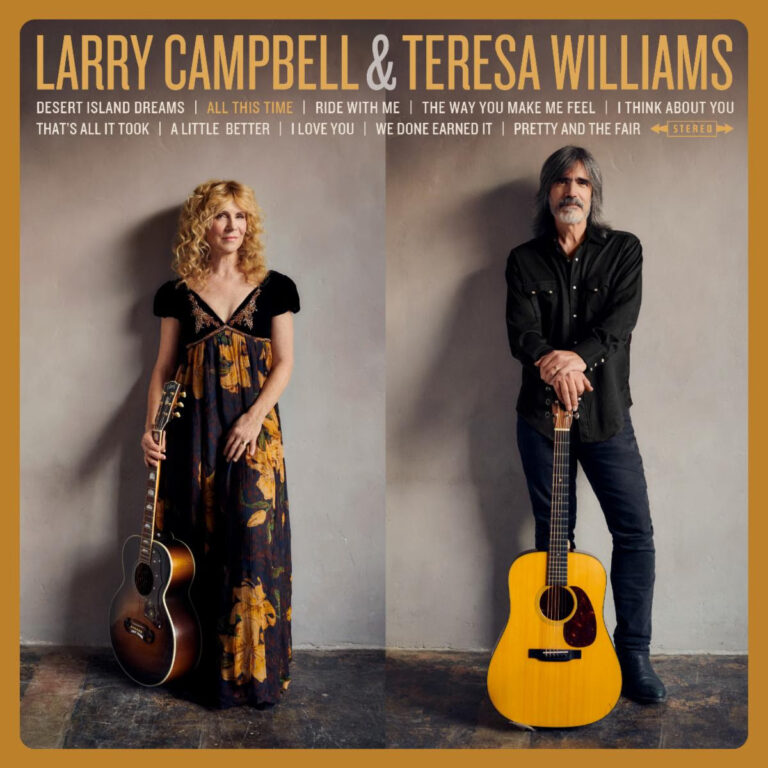REVIEW: Larry Campbell and Teresa Williams Keep Musical Partnership Durable & Potent With All This Time
Artist: Larry Campbell and Teresa Williams
Album: All This Time
By: Doug Collette
Pictured conspicuously at a distance from each other on the front cover of All This Time, Larry Campbell and Teresa Williams nevertheless present a deep and abiding connection to each other on their third studio album (and fourth LP overall).
As in the previous efforts, the duo mixes original material with carefully chosen covers, all of it rendered with exquisite instrumental taste. But, in a marked departure and expansion of the heretofore carefully crafted sound, this collection crackles with a vivacity that sets the record apart from its predecessors.
Like the duo’s eponymous debut, Contraband Love, and Live At Levon’s, however, All This Time is no less of a labor of love than those records. Indeed, Campbell and Williams spared no expense in tendering the results of sessions recorded and mixed by Justin Guip to Greg Calbi at Sterling Sound for mastering. As a result, the audio for “Desert Island Dreams” sparkles as much as the performance.
Fittingly opening the LP, this cut is an ode to escapism with all the wallop (if not more of it) of last year’s concert piece Live At Levon’s. Likewise–and also most appropriately–this title tune packs its punch: beginning with acoustic guitars, the ensemble then moves into a fleet organ solo from Little Feat’s Bill Payne, cushioned by some rippling electric guitars.
Concise as are such cuts here as “Ride With Me,” the total of ten, running around thirty-seven minutes, amounts to something of an embarrassment of riches, in emotional content if nothing else. There, the prominence of William’s lead voice alone sets out in sharp relief those instances in which she shares the vocal role with Campbell (who steps to the fore on his own in singing the good-times “The Way You Make Me Feel”); when their voices harmonize, as on “I Think About You,” the effect is sublime.
Still, its impact is no greater than that radiated by arrangements wherein producer Larry emphasized economy and discipline. Especially in his use of electric guitar (in addition to mandolin and pedal steel), the former sideman of Bob Dylan and Phil Lesh refuses to waste notes; in that regard, he’s setting a pragmatic tone mirrored in the accompaniment of bassist Brandon Morrison as well as accordionist Brian Mitchell’s organ contributions, such as the one on Julie Miller’s “I Love You.”
There’s a palpable sense of liberation in the expression of mutual feeling from the two principals, an effect all the more complementary with the unified self-control of the musicians that dominates elsewhere. Notwithstanding the decided progression of All This Time represents, more than a little of still sounds like Campbell and Williams’ earlier work in the studio and on the stage, i.e., a modern take on the collaborations of the late Gram Parsons and Emmylou Harris.
But aside from covering songs by the Louvin Brothers–a major influence on the former–the comparison has never been more apt than on “That’s All It Took” (recorded by Parsons and Harris on GP, the former’s first solo outing). Campbell’s pedal steel here mirrors the vulnerability in Williams’ vocal, while Payne’s piano underscores the mood. Needless to say, the stout presence of the late Levon Helm at the drum kit parallels that punctuation.
The ever-so-slight barrelhouse atmosphere this George Jones original conjures also dovetails quite succinctly with the album closer by former Youngblood Jesse Colin Young. “Pretty And The Fair” evokes the bucolic upper New York state of Woodstock where Larry Campbell and Teresa Wiliams first connected, then flourished via collaboration with the now-deceased member of The Band. And it’s a bond the couple reaffirms via the juxtaposition of that selection with the earthy likes of “We Done Earned It.”
An echo of the record’s opening whimsy, the track sequencing is thus just another aspect of how All This Time resonates in such deep and abiding ways. As such, it confirms the increasingly durable nature of Larry Campbell and Teresa Williams’ expanding body of work.

